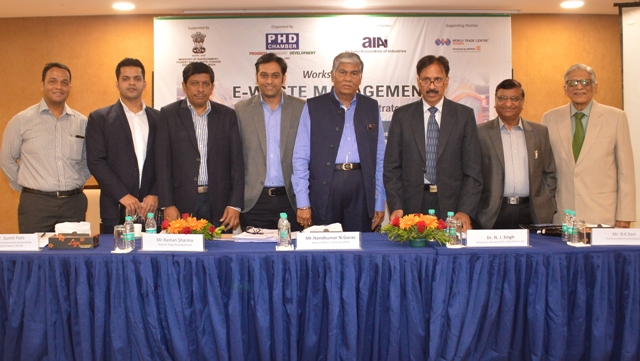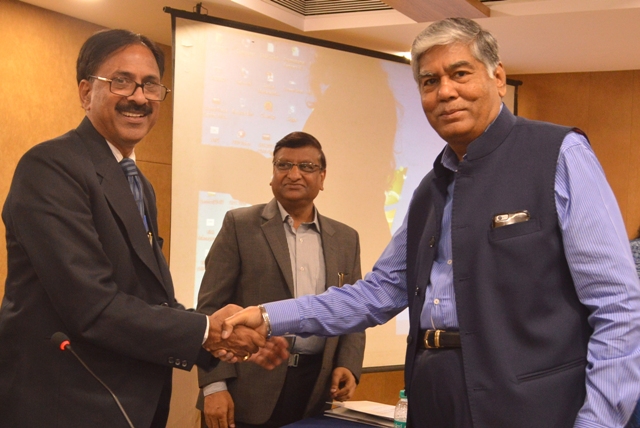- Home
- About
- Team
- About the President
- Mission
- Advisory bodies
- Associates
- Privacy Policy
- Terms and Conditions
- Cancellation, Returns & Refund Policy
- Pricing Policy
- Services
- Activities
- Events
- International Desk
- Sectors
- MSME
- Membership
- Publication
- Media
- Contact
Unfair Prosecution Rules streamlined
Unfair Prosecution Rules streamlined
Currently, 90% of e-waste is managed by the unorganized sector comprising of unskilled kabaadiwallas. There is a pressing need to integrate this unorganized sector with the organized sector through skill development.
“Creating awareness among every individual on eco-friendly recycling of electronic waste is the most important step for the successful implementation of the E-waste Management Rules 2016. It is the responsibility of every citizen to comply with these rules. Maharashtra is the first state to introduce inventorisation of e-waste in 2005. Maharashtra Pollution Control Board (MPCB) has introduced the enforcement policy for the E-Waste Management Rules 2016, however it does not allow its tribunal and officials to prosecute defaulter to prevent unfair prosecutions. A field officer can only issue a show cause notice till is heard by an official at a higher level of the Pollution Control Board. Unlike the earlier rule of 2011, the revised e-waste management rules (2016) provides simplified procedure for authorization of e-waste recyclers, extending responsibility of waste management to refurbishers as well,” said Mr. Nandkumar Namdev Gurav, Regional Officer, Technical, MPCB at a Workshop on E- Waste Management — Challenges, Prospects and Strategies. The workshop was organized by PHD Chamber of Commerce and Industry in association with All India Association of Industries (AIAI), and supported by Ministry of Environment, Forest and Climate Change, Government of India and World Trade Centre Mumbai. The key feature of the E-Waste Management Rules 2016 is the introduction of the provision of the Extended Producer Responsibility (EPR) for effective channelization of E-waste to the registered dismantlers or recyclers.
Dr. N. J. Singh, Whole Time Director (EHS), DCM Shriram pointed out that India has emerged as the world’s 5th largest electronic waste producer and it discards roughly 18.5 lakh tonne of e-waste every year where in telecom equipment alone accounts for 12%. The industry must focus on environmentally sustainable and harmonized approach for recycling.
Mr. Sumit Patil, Consultant Environmental Sustainability, Health & Safety, TCS Ltd., explained the in-house e-waste management system adopted by the company based on its policy on Management and Disposal of e-waste.
Mr. B.K. Soni, Chairman & MD, Eco Recycling Ltd. opined that the government must focus on the three Is of training, transport and technology to create a sustainable formal system of e-waste management. The first T refers to imparting of skills on informal kabadiwalas about eco-friendly methods of e-waste management. The second T refers to investment in reverse logistics to transport e-waste from generation points to collection centres. The third T refers to use of cutting-edge technology to recover assets from e-waste.
Making suggestions to the government, Mr. Raman Sharma, Director, Exigo Recycling Pvt. Ltd. said the government must introduce National Pricing Strategy for people disposing electronic waste, simplify compliance and administrative procedures. The government must also make it compulsory for manufacturers to introduce deposit refund scheme to incentivize consumers to return their old hardwares. Also, the municipal authorities must cancel tender process for awarding waste management contracts and instead choose from a panel of 3-4 recyclers, he suggested.
Earlier in his welcome remarks, Mr. Vijay Kalantri, Vice Chairman, World Trade Centre Mumbai said, “Prosecution cannot be the only solution to solve the menace of e-waste. The government must provide amnesty scheme for micro, small and medium enterprises (MSMEs) not complying with the e-waste rules and must start education and awareness programme at the grassroot level for better compliance in future. Considering that 60% of the waste is generated in around 10 cities in India, the e-waste management drive must largely focus on metros. There are over 500,000 rag pickers in Mumbai and the government must train them on efficient e-waste management practices. The industry and government must work together to create an effective legal framework to address e-waste menace. The government must offer incentives such as tax rebate for industries to comply with e-waste rules. The government must also appoint a celebrity ambassador to promote best practices in e-waste management. The informal e-waste recyclers must be integrated with the formal sector through training and skill development.”
 (L to R): Mr. Sumit Patil, Consultant, Environmental Sustainability, Health & Safety, TCS Ltd, Mr. Raman Sharma, Director, Exigo Recycling Pvt. Ltd., Mr. Nandkumar Namdev Gurav, Regional Officer, Technical, MPCB, Mr. Piyush Sharma, Deputy Secretary, PHD Chamber of Commerce and Industry, Mr. Vijay Kalantri, President, AIAI and Vice Chairman, World Trade Centre, Mumbai, Dr. N. J. Singh, Whole Time Director (EHS) DCM Shriram Ltd, Mr. B. K Soni, Chairman & M.D Eco Recycling Ltd, Y. R. Warerkar, Executive Director, World Trade Centre, Mumbai.
(L to R): Mr. Sumit Patil, Consultant, Environmental Sustainability, Health & Safety, TCS Ltd, Mr. Raman Sharma, Director, Exigo Recycling Pvt. Ltd., Mr. Nandkumar Namdev Gurav, Regional Officer, Technical, MPCB, Mr. Piyush Sharma, Deputy Secretary, PHD Chamber of Commerce and Industry, Mr. Vijay Kalantri, President, AIAI and Vice Chairman, World Trade Centre, Mumbai, Dr. N. J. Singh, Whole Time Director (EHS) DCM Shriram Ltd, Mr. B. K Soni, Chairman & M.D Eco Recycling Ltd, Y. R. Warerkar, Executive Director, World Trade Centre, Mumbai.

Photo Caption 2 (L to R): Mr. Vijay Kalantri, President, AIAI and Vice Chairman, World Trade Centre and Dr. N.J. Singh, Whole Time Director (EHS) DCM Shriram Ltd.
Recent Posts
- Russian Businesses seriously exploring Trade and Investment Opportunities in India 17th Dec 2025
- Strengthening India–Sri Lanka Business and Trade Linkages: AIAI and WTC Mumbai Holds Strategic Meet with Sri Lankan Consulate 01th Dec 2025
- INFRASTRUCTURE AND CONNECTIVITY AS GROWTH ENGINE: AIAI and WTC MUMBAI CHARTS PATH FOR ECONOMIC DEVELOPMENT AT THE 10TH GLOBAL ECONOMIC SUMMIT 01th Dec 2025
Categories
- Agriculture
- Banking and finance
- Biotechnology
- Business Process Outsourcing
- Chemicals
- Defence
- Drugs & Pharmaceuticals
- Economic Affairs & Taxation
- Energy
- Engineering
- Exports & Imports
- Food Processing
- Food Processing
- ICTE Manufacturing
- Inbound delegation
- Information & Communication Technology
- Infrastructure
- Innovation
- Logistics
- Manufacturing
- Media & Entertainment
- Medium & Small Scale Industry
- Micro
- Oil and Gas
- Petrochemicals
- Ports
- Power
- Press Information Bureau-Government of India
- Press Release
- Press Release: Quanzhou Delegation Explores Business Collaboration in India
- Renewable Energy
- Tourism & Hospitality
- Uncategorized
- Women Empowerment
Archives
- December 2025
- October 2025
- July 2025
- June 2025
- April 2025
- March 2025
- January 2025
- December 2024
- June 2024
- May 2024
- April 2024
- March 2024
- January 2024
- November 2023
- October 2023
- September 2023
- August 2023
- July 2023
- June 2023
- May 2023
- April 2023
- March 2023
- February 2023
- January 2023
- February 2022
- January 2022
- December 2021
- November 2021
- October 2021
- September 2021
- August 2021
- July 2021
- June 2021
- May 2021
- April 2021
- March 2021
- February 2021
- January 2021
- December 2020
- November 2020
- September 2020
- August 2020
- June 2020
- May 2020
- April 2020
- March 2020
- February 2020
- January 2020
- November 2019
- August 2019
- July 2019
- May 2019
- April 2019
- March 2019
- July 2018
- June 2018
- April 2018
- February 2018
- January 2018
- December 2017
- November 2017
- October 2017
- September 2017
- August 2017
- July 2017
- June 2017
- May 2017
- April 2017
- March 2017
- February 2017
- January 2017
- December 2016
- November 2016
- October 2016
- September 2016
- August 2016
- July 2016
- June 2016
- May 2016
- April 2016
- March 2016
- February 2016
- January 2016
- December 2015
- November 2015
- October 2015
- September 2015
- August 2015
- July 2015
- June 2015
- May 2015
- April 2015
- March 2015
- February 2015
- January 2015
- December 2014
- November 2014
- October 2014
- September 2014
- August 2014
- July 2014
- June 2014
- May 2014
- April 2014
- March 2014
- February 2014
- January 2014
